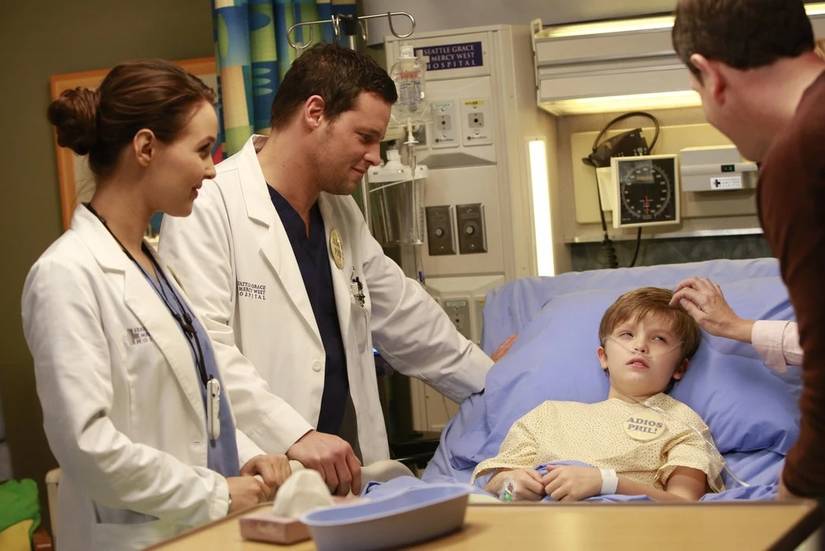
Some ideas were more medical and serious, while others leaned into character drama. Ultimately, the chosen title symbolizes both the show’s anatomical focus and emotional depth. Rhimes’ choice to title the series Grey’s Anatomy is a clever play on a real-life medical textbook that also pays homage to the protagonist, blending surgical brilliance with messy human relationships.
“Doctors” Was Safe and Literal, But Too Generic to Be Iconic
Playing It Safe Could Have Buried the Show in Medical Drama Sameness

“Doctors” was reportedly an early placeholder for Grey’s Anatomy, and it is an extremely literal title. It does not take much imagination to see why. The name is broad and encompassing, which might seem fitting for an ensemble cast in a hospital setting. However, it is simply too bland to be memorable. There is no hook, no wit, no emotional response in the word alone. It says what the show is about, but not why it matters.

Dozens of medical shows have come and gone, and many used titles that were straightforward or impersonal. “Doctors” would’ve blended right in. It also fails to provide the audience with a focal point, a character to care about from the outset. It is impersonal, while Grey’s Anatomy is intimate. Although a generic title like “Doctors” might have made the show easier to market in the short term, it would have faded into the crowd of other hospital dramas.
The show’s uniqueness lies in how it uses medical scenarios as a lens for deeply human experiences, and the title needed to reflect that. Ultimately, “Doctors” was too safe. Rhimes has since proven time and again with shows like Scandal and How to Get Away with Murder, that bold titles with personality are part of her brand. A title like “Doctors” might have diluted the emotional core and cultural impact of the show before it even began. It just didn’t have the soul.
“Surgeons” Was Too Clinical to Capture the Show’s Emotional Core
It Described the Job But Missed the Heart
Many hospital shows leaned heavily on procedural formats, where case-of-the-week took precedence over character development. “Surgeons” fit that mold. But that was never Rhimes’ goal. From the beginning, she envisioned something deeper. Characters like Meredith, Cristina Yang (Sandra Oh), and Derek Sheperd (Patrick Dempsey) were always the heart of the story. While “Surgeons” is technically accurate, it felt cold and clinical.
Meredith Grey has been the beating heart of Grey’s Anatomy for years, but that doesn’t mean she hasn’t made poor choices in life.
It did not leave space for the messiness of friendship, love, heartbreak, ambition, or personal growth, which are themes that would become central to Grey’s Anatomy. The title lacked personality. It did not hint at the vulnerability or humor Rhimes layered into every episode. It also risked being mistaken for just another run-of-the-mill hospital drama. Without a unique hook or emotional edge, “Surgeons” would likely have blended into the background of early 2000s television.
“Complications” Was Clever, But Might Have Sounded Too Dark and Ironic
A Dramatic Double Meaning That Overlooked the Warmth
“Complications” was another title option, and it cleverly referenced both medical challenges and the tangled personal lives of the characters. The dual meaning aligned well with Shonda Rhimes’ vision: a story where surgeons not only face life-or-death decisions in the OR but also navigate emotional turmoil in their relationships, friendships, and personal ambitions. It had more intrigue than earlier options like “Surgeons” or “Doctors,” and it hinted at the layered storytelling Rhimes would become known for.
It still posed a few challenges, however. It carried a slightly ominous tone. “Complications” sounds like the name of a high-stakes thriller or mystery series, which is not the tone of this iconic medical series. Although Grey’s Anatomy includes dramatic and intense moments, it is based on its slow-burning, character-driven arcs. These are the kinds of stories that unfold over time and let viewers grow alongside the cast.
“Complications” reflects the core of Rhimes’ storytelling, which embraces the unpredictable messiness of both medicine and life. However, it could have worked better for a darker version of the series, one with less levity and more grit. Ultimately, it lacked the emotional warmth, depth, and subtlety that Grey’s Anatomy brought to the table. It was close, but not quite the right fit.
“Grey’s Anatomy” was the Perfect Mix of Medical Symbolism & Character Depth
A Recognizable Title That Would Become the Most Iconic in the TV Landscape

The title, Grey’s Anatomy, is both a brilliant pun and a heartfelt tribute. On the surface, it highlights the show’s central character, Meredith Grey. It also plays on Gray’s Anatomy, the infamous 1858 medical textbook written by Henry Gray and illustrated by Henry Vandyke Carter. That book has been a cornerstone of medical education for generations. By borrowing and reshaping the title, Shonda Rhimes did something clever and meaningful.
Every episode dissects feelings, decisions, and relationships with the same intensity it applies to medical procedures. The name is elegant, layered, and instantly memorable. It signals to the audience that this is not just another hospital drama. It is a story with heart, soul, and introspection. Also, the title allows room for growth. As Meredith evolves from intern to attending, from grieving daughter to resilient mother, her personal anatomy is revealed piece by piece.
That transformation echoes the textbook’s structure, where each system is broken down and explored. Rhimes was not just telling stories about people in scrubs. She was exploring what it means to be human under pressure, scrutiny and emotional strain. Similarly, characters in the show reveal different aspects of the human experience, like grief, ambition, fear, love, and resilience. From Cristina’s fierce drive to Bailey’s (Chandra Wilson) strength and vulnerability, the series dissects their emotional layers with precision.

